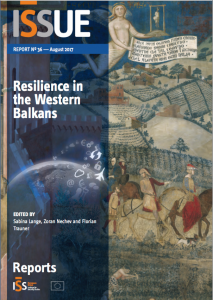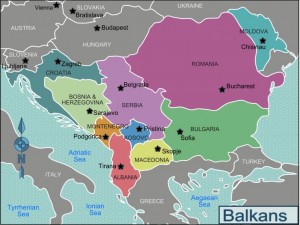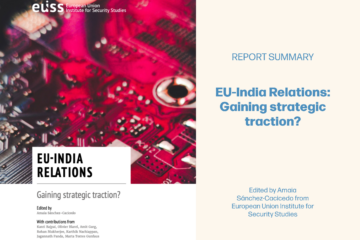Resilience in the Western Balkans
[:en]Edited by Sabina Lange, Zoran Nechev and Florian Trauner (Institute for Security Issues)
A recently released report by the Institute for Security Studies sheds light on the increased interest on the Western Balkans as the region has the ability to challenge EU stability at its borders. As economic, political, and social issues re-emerge in the region that do not align with the EU´s mission, a door is opened for intervention and dialogue that could be beneficial for both. So far, the EU´s most powerful tool for negotiation has been the possibility of enlargement- that is the prospect of becoming a EU member.
The detailed report provides two main sections, one delving into internal drivers and another on the external drivers of potential instabilities and threats to economic and social order in the region. The report states that the main region´s vulnerability is caused by the influx of refugees and migrants, as well as the increased number of people in the Western Balkans joining radical and terrorist movements. Although the report realizes that the EU´s enlargement promise is a powerful tool, it also recognizes that more than just promises are needed to be made.
In particular, the authors agree on that the EU needs to narrow down a set of resilience targets in the region and use its policy power to make a difference in the region. Furthermore, the report also calls on the EU to use the Western Balkans´ states capacities, as they do have a lot to offer. Other external drivers also include the impact of NATO, the US, Russia, China, and Turkey and the Gulf States. These are of special concern to the EU, because it is in its interest to keep close relationships and influence over the Western Balkans to avoid further external instabilities.
The report concludes with that “a credible accession process grounded in strict and fair conditionality is essential to foster resilience in these countries.” The EU has the power of being the leader and guide a well thought-out strategic plan in the region´s stability.
Read more here:
 [:da]Edited by Sabina Lange, Zoran Nechev and Florian Trauner (Institute for Security Issues)
[:da]Edited by Sabina Lange, Zoran Nechev and Florian Trauner (Institute for Security Issues)
A recently released reportby the Institute for Security Studies sheds light on the increased interest on the Western Balkans as the region has the ability to challenge EU stability at its borders. As economic, political, and social issues re-emerge in the region that do not align with the EU´s mission, a door is opened for intervention and dialogue that could be beneficial for both. So far, the EU´s most powerful tool for negotiation has been the possibility of enlargement- that is the prospect of becoming a EU member.
The detailed report provides two main sections, one delving into internal drivers and another on the external drivers of potential instabilities and threats to economic and social order in the region. The report states that the main region´s vulnerability is caused by the influx of refugees and migrants, as well as the increased number of people in the Western Balkans joining radical and terrorist movements. Although the report realizes that the EU´s enlargement promise is a powerful tool, it also recognizes that more than just promises are needed to be made.
In particular, the authors agree on that the EU needs to narrow down a set of resilience targets in the region and use its policy power to make a difference in the region. Furthermore, the report also calls on the EU to use the Western Balkans´ states capacities, as they do have a lot to offer. Other external drivers also include the impact of NATO, the US, Russia, China, and Turkey and the Gulf States. These are of special concern to the EU, because it is in its interest to keep close relationships and influence over the Western Balkans to avoid further external instabilities.
The report concludes with that “a credible accession process grounded in strict and fair conditionality is essential to foster resilience in these countries.” The EU has the power of being the leader and guide a well thought-out strategic plan in the region´s stability.
Read more here:



